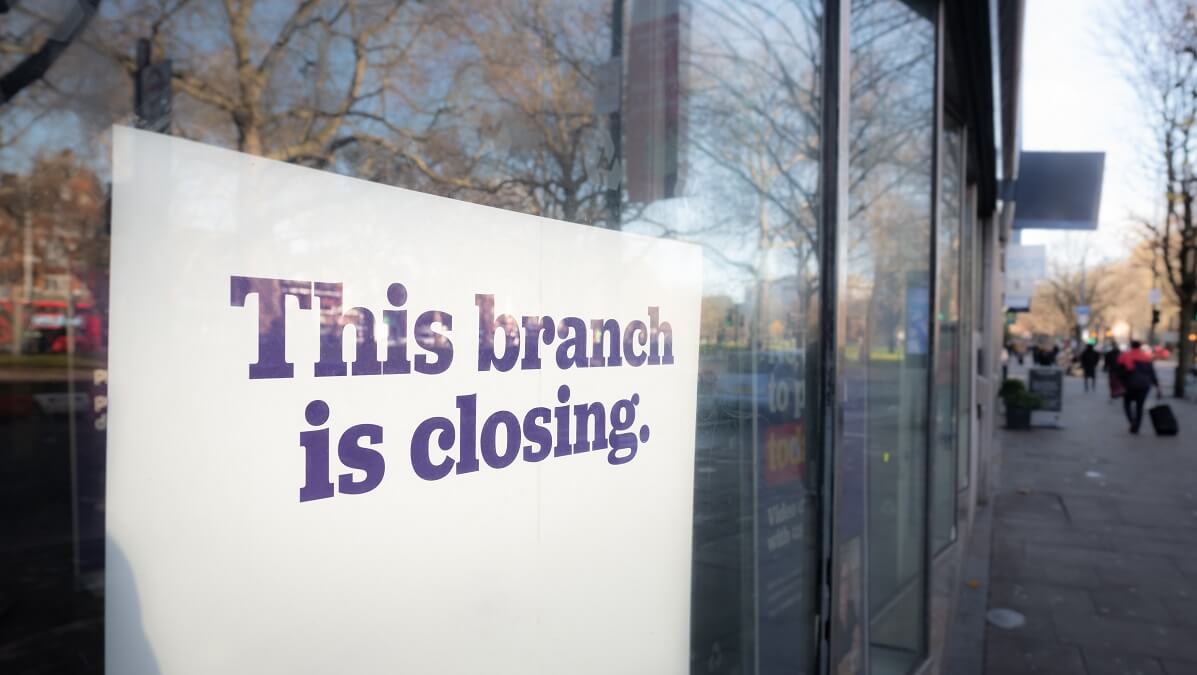The ongoing closure of bank branches, particularly in regional areas, has been blasted by a government taskforce.
Banks need to better support regional communities, the Regional Banking Taskforce says in its final report.
But if you’re hoping the closure of regional branches is going to stop, or at least slow down, you’re likely to be sorely disappointed.
So says national secretary of the Finance Sector Union (FSU) Julia Angrisano, who is scathing of the taskforce, branding its process a “total failure”.
According to the Treasury website, the aim of the taskforce – set up by the federal government last October – was to “bring banks and other key stakeholders to work together in partnership to assess how bank branch closures have impacted local businesses, industries and communities and work collaboratively to identify possible solutions”.
Read: Banking sector in transition – whether you like it or not
Ms Angrisano was hoping that the possible solutions would include preventing any further closures, especially taking into consideration that an estimated 64 per cent of regional bank branches have closed within the past 50 years. She says those hopes have been dashed.
Not one of the recommendations made in the report will prevent further branch closures, she says.
“The report says that better consultation once a decision has been made to close a bank branch is a fix to this crisis. This will do nothing at all to slow down and stop the rate of closures across regional Australia,” Ms Angrisano says.
Read: The bank that doesn’t want your money
Seven recommendations were made, including:
- reviewing and strengthening the Australian Banking Association’s branch closure protocol, and implementing branch closure impact assessments
- promoting and supporting Bank@Post services and maintaining access to cash
- improving support for regional consumers experiencing vulnerability
- supporting digital connectivity and literacy
- reviewing the Australian Prudential Regulation Association data collection to better understand how people do their banking.
The taskforce brought together senior representatives from banks, (including ANZ, CBA, NAB, Westpac, Bendigo Bank, Adelaide Bank and the Bank of Queensland), peak bodies such as the Australian Banking Association and the Australian Chamber of Commerce and Industry, Australia Post and the Australian Local Government Association.
That, says Ms Angrisano, is one of the taskforce’s key failures. “The so-called taskforce refused to hear from the FSU or our members. It held only a handful of meetings and achieved absolutely nothing.”
Westpac has pointed to a decline in face-to-face banking as the reason behind some of its branch closures, but what is driving that decline is a matter of some conjecture. Ms Angrisano says she has been told of instances where over-the-counter customers are taken outside to do their banking.
“Our members tell us that the numbers of ‘over the counter’ transactions each day are counted up and once a limit is reached, customers are taken to a computer inside the branch or to an ATM outside and shown how to do their banking online,” she says.
‘Unacceptable and disingenuous’
Whether or not the justification for regional closures is valid, it would appear the banks aren’t planning to put a halt to them, leaving some towns that previously had multiple banks with none.
Wongan Hills, in Western Australia’s wheat belt, is one such case, with Westpac announcing last month that it would be closing the town’s only bank. Residents are incensed, and with good reason, says Wongan Hills Progress Association president Stephen Clarke.
Read: Rate of bank closures surprises even those supposedly in the know
“I just can’t believe a major corporate like Westpac would consider closing the only bank in town,” he said. “You’re asking people to do a 90 to 120 kilometre drive, and then turn around and come home again. This is unacceptable and disingenuous.”
Wongan Park residents are hoping to speak with a Westpac representative in a bid to maintain some local banking services.
Their story continues to be repeated across regional Australia. While the closure of branches looks set to continue, affected residents will be hoping that the recommendations made in the Regional Banking Taskforce report are implemented at the very least, but while they hope for the best, they are bracing for the worst.
Has your town been left without a bank? Have you been supported by your bank since? Do you need a local bank? Why not share your experience in the comments section below?


Our town, Woodend (Vic) has just had it’s Commbank branch closed. The only alternative left is Bendigo Bank agency (limited functionality) and the oft quoted “Bank@Post”. This would mean the already long queues at our Hong Kong style Post Office would get even longer. I believe that Australia Post should look at setting up a Regional Community Bank, operating in it’s own premises outside the Post Offices, similar to what they did a number of years ago in New Zealand.
Banks are closing, removing ATMs and generally making it difficult to deal with them. A perfect storm for a new form of financial institution to step up. If the government was serious about holding the banks who have preyed on society for some time, they would offer security to these new groups and remove the support the banks have that props them up. Put some action rather than rhetoric into play.
It should be legislated that there should be secure banking facilities in every gazetted town or suburb.
The Banking Council should assure that at least one of its members provides a service.
There should be punitive measures applicable to all banks after twelve months from the passing of the legislation, for each week each service is not provided of $1,000.00 per week.
Post Offices do not have the necessary.
It is ridiculous that businesses cannot securely lodge cash or obtain cash for small transactions, or discuss aspects of their business.